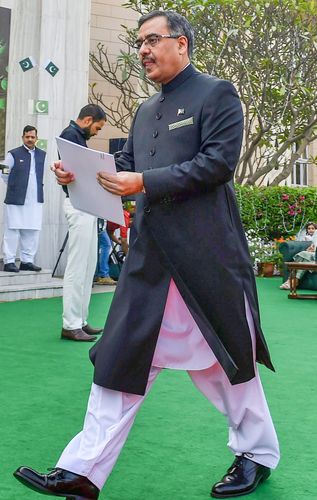IT WAS ON a cricket ground that the legendary coach Gurcharan Singh first met Sohail Mahmood, Pakistan’s new foreign secretary. A match was in progress at the British High Commission in Delhi, and Singh was bowling. “A diplomat doesn’t have time to practise each day,” Singh said. “But Mahmood managed to connect with the ball each time. He is a good batsman.”
Singh, 84, made one request to Mahmood. He had left his village across the border when he was 12, and he wanted to go back home.
The visa came with astonishing speed—in a day. “I visited the Gaddafi Stadium (in Lahore), where Mahmood had arranged a special visit with Pakistan administrators. I cannot explain what it means to me to have seen my house after 72 years. I met people who knew my parents.”
Mahmood may not have the ability to influence foreign policy or change the narrative. Foreign secretaries rarely do, especially in Pakistan. But his appointment after his India stint indicates which way the wind is blowing in Pakistan.
In his 19 months as Pakistan high commissioner, Mahmood underwent baptism by fire. He had been to South Block many times, but few of those meetings were friendly. An undeclared war, punctuated with ceasefire violations, became the new norm. A range of issues—Kulbhushan Jadhav’s imprisonment, terror attack at Pulwama and India’s Balakot strike—worsened relations between the two countries.
“There was a high degree of oscillation in India and Pakistan relations,” said Mahendra Lama, who teaches at the School of International Studies at the Jawaharlal Nehru University in Delhi. “But Mahmood brought it back to normal. It is a credit to both him and our high commissioner. High commissioners play a critical role. It is important for institutions to play a role rather than individuals. It is the best kind of diplomacy.”
During his stint in India, he overcame the diplomatic deep freeze by finding new ways—like initiating a massive reach out. As many as 33,635 visit visas were issued to Indians last year by the Pakistan High Commission, which translates to around 111 a day. The high commission had issued 52,183 visas in 2017.
The high numbers reflected Mahmood’s commitment to keeping communication channels open. The hope could be that people-to-people connections, which go beyond government ties, will be a game-changer. The opening of the Kartarpur corridor and other shrines to Indians are steps in this direction. It also fits into the narrative of Prime Minister Imran Khan’s ‘Naya Pakistan’—a nation that roots for peace and extends an olive branch.
The Sikh festival of Baisakhi fell on April 14 this year, and on that day the Pakistan High Commission set a record by issuing 2,200 visas. Coupled with Naya Pakistan’s soft power mission, Mahmood’s initiatives have been able to counter the overwhelming narrative of Pakistan being India’s enemy. Sources say he keeps his doors open for anyone who has a different approach to maintaining India-Pakistan ties.
Those who know Mahmood describe him as a hardworking, serious-minded and seasoned diplomat. Before he came to India, he was posted in Ankara, where he proved his mettle by bringing Turkey and Pakistan closer. Turkish President Recep Tayyip Erdogan’s offer to mediate in Kashmir—which figured prominently in his meeting with Prime Minister Narendra Modi in India in 2017—was the result of Mahmood building a case for Kashmir.
The links that he made in his previous postings will matter more. Mahmood served in Washington, DC, and acted as political coordinator in Pakistan’s delegation to the UN Security Council.
Like India, the US will loom large in the Pakistani foreign policy horizon. America holds many cards, the most powerful being the proposed International Monetary Fund bailout. Post Balakot, the pressure on Pakistan to crack down on terror will increase—or so India hopes. In the United Nations Security Council, China has been stonewalling attempts to designate Jaish-e-Mohammed founder Masood Azhar a global terrorist. But, with 14 of 15 member states of the UNSC backing the efforts, it is only a matter of time before China caves in.
Peace and better ties with India will go a long way in making things easier for Pakistan. Imran Khan seems to understands this; even the Pakistani army is said to be on the same page. He recently told foreign journalists that there was a better chance of peace talks if the BJP returns to power.
With the impending US pullout from Afghanistan, Pakistan continues to bank on its influence on the Taliban. The peace talks between the Taliban and the US, which were to have representation from the Afghan government for the first time in 17 years, was again called off recently. So, it is advantage Pakistan.
Mahmood has been courting the peace constituency without diluting his government’s line. He had continued links with the Hurriyat Conference in Kashmir, despite India’s objections. Yet, to his credit, it did not turn into another diplomat spat.
His balancing skills, sharpened by his India stint, will serve him well in his new role. Especially, when a new government takes charge in New Delhi, and the demand for peace talks surfaces again.
Mahmood has demonstrated his commitment to engage with India. The question is, would that be enough?


